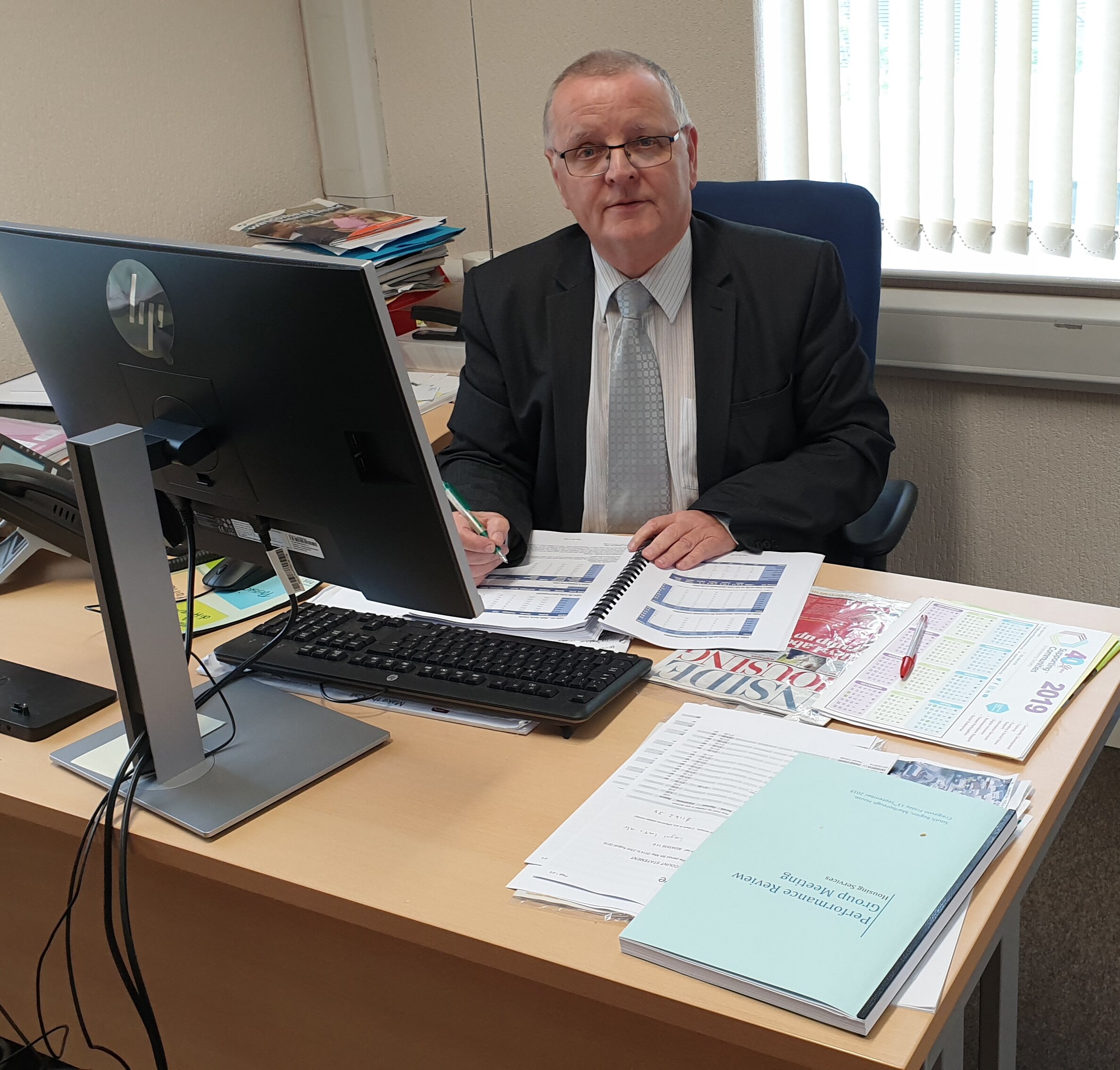Interview with Michael Dallat: Lessons from Doury Road
/Michael Dallat, Housing Executive
Michael Dallat, the Housing Executive’s Area Manager for Mid-Ulster, spoke to us about his memories of working in the area that went on to become Supporting Communities founding project.
The beginning of the Doury Road Estate’s Tenant Action Project coincided with Michael’s early trainee days with the Housing Executive and gave him his first taste of grassroots tenant involvement. Working with the people in that area, getting to know and understand the issues that affected them, and collaborating with other agencies to make the changes that could help were important lessons he carried with him long after his career moved him on to other parts of the country.
Michael reflected on those early days in a phone interview with Supporting Communities:
“Like your chairperson Lorraine Campbell, I joined the Housing Executive as a trainee in 1977. My first involvement with the Tenant’s Action Project, as it was called back then, was in 1979 when I was appointed the Housing Officer for the Doury Road Estate in Ballymena. At that stage, there were 600 dwellings and I worked there for three years. That was my first introduction to Brian Holmes. Brian worked closely with the Housing Executive to deal with daily issues such as abandoned dwelling, repairs, and street lighting amongst other things. There was no interagency working at the time. Brian was the catalyst in bringing relevant agencies together.
At the time, the Doury Road was an area of great social deprivation including physical decay, abandoned homes, unemployment, family breakdown, antisocial behaviour and addictions. The estate was suffering from neglect and people did not want to live there. The estate was prone to ‘moonlighting’ meaning that I would discover some tenancies had been abandoned in the night, stripped of anything worth taking, which led to houses quickly running into serious disrepair.
There were some terrible stories you heard about how the wider society perceived the area. Many people living in the Doury Road at that time were embarrassed to tell people where they lived. There was quite a malicious attitude towards the residents there. I heard about people’s children being shunned at school and elsewhere because of where they came from. It was the human side - those were the stories that stayed with me.”
The Doury Road Project led by Brian Holmes aimed to make sweeping changes in the area and needed to try new tactics to get a range of organisations on board to help.
This was the start of the interagency approach that is still at the core of Supporting Communities’ work. As a housing officer, Michael was hands-on in the middle of this effort, doing estate inspections, talking to residents, and meeting with other agencies to find effective ways of tackling the area’s problems.
“We asked the University of Ulster to come in and carry out a comprehensive survey of how residents perceived the effectiveness of services in their area. The survey highlighted what the resident’s feelings were about various agencies which created the foundation for how we went on to deal with problem estates. This survey of attitudes was the basis for creating an estate-based strategy to deal with the Doury Road.
We worked with Brian Holmes and the University of Ulster to create an interagency approach, a necessary tool to deal with priority estates. It was usual for us to be doing walkabouts, listening to residents’ concerns, bringing other agencies on board and so on. From 1979 to 1982 when I left, we could see evidence of the area improving. There was full occupancy of all the housing stock and our work was paying dividends.
At the end of the day, it was a necessity to have someone like Brian to push things forward. He was really able to zero in on specific problems and he was there to encourage and challenge other agencies to get involved and to bring them together to develop and implement the first Priority Estates Project. That’s how Supporting Communities took off.”
Michael has been with the Housing Executive ever since and he has worked over the next 40 years in areas such as Rathcoole, Carrickfergus, Antrim and Belfast. He has seen the principles established in Doury Road grow into the organisation now known as Supporting Communities and successfully implemented all over Northern Ireland.
“There’s a quote that stays with me. My manager at the time, Kathleen McNichol, always said the key to our work was to ‘find out what people want’. Supporting Communities has been an essential part of getting that community involvement in our estates and the Housing Executive has been very supportive of that approach and the initiatives that have grown from it.”
We asked Michael if his involvement with Supporting Communities has had an impact on his career and on him personally. He told us he got an education working with the people in Doury Road and that it awakened a sense of social justice in him that has been a driving force in his life.
“Listening to the stories of how people are treated because of where they live, that had a real impact on me. There were a lot of good people, decent people, that lived in the Doury Road, who in many ways were forgotten about by the agencies. I never lost the basic approach I learned in that first post - treat people with respect and dignity. If it wasn’t for learning that approach, I wouldn’t be in my job now. I realised back then I was there to listen to [the tenants] and their concerns and to do right by them as a social housing provider, not just to keep a property like a private landlord.”










